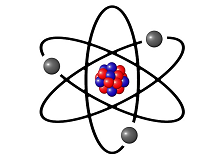Nuclear Engineer Career
Nuclear Engineer Career
The Real Poop
When you read, hear, or even think the word nuclear, you probably think about it in relation to a big bomb. And yes, it's nuclear science that enables countries to build nuclear weapons. But nuclear science also opens doors to a whole lot of useful and less mass-destructive-y applications.
Nuclear science has only been a thing for about a century or so. It began in the very late 19th century when Nobel winner and German über-scientist Wilhelm Conrad Röntgen discovered a type of energy ray that could pass through solid objects (source).
He called it "X," with "X" being a symbol for the unknown, and basically created an entire scientific discipline in the process. One that pays well, too—the average salary for a career in nuclear science is around $100,000 (source).

These "X-men"—whoops, we mean "X-rays"—began the process that would put the nuclear world on the map. Doctors began to use X-rays to see inside people's bodies, and scientists began doing experiments. One of those experiments led to the discovery that uranium emits light on its own—also known as radiation.
Röntgen's discovery kicked off a whole host of discoveries and advances and golly-gees in science. There was the discovery of "radioactivity"; the revelation that all atoms contained a tiny little center called a nucleus; quantum physics; nuclear fission—we could go on (but we won't).
What does any of this mean to you, besides answers to questions on a basic science exam? As it turns out, a big wad of nuclear power is produced when a nucleus absorbs a neutron and splits into two lighter nuclei.
This releases a whopping load of energy which produces heat—much easier, quicker, less expensive, and less polluting than traditional fossil fuels, like coal. It's the responsibility of the nuclear engineer to create that energy, harvest it, and develop new ways for it to be used.
Nuclear engineers (and chemists and physicists) do a variety of jobs. Some work with electrical utility companies, designing and licensing electrical plants. Others work with regulatory agencies, providing information and consulting about best safety practices. Some work for the government (often within the Department of Energy) and still others go into medicine or even food science.

That's right: nuclear scientists working with the nation's food supply. Did we mention you need to be a careful person to be a nuclear engineer? You need to be a careful person.
The last third of the 20th century saw a bevy of new ways to utilize this powerful—and often dangerous—method of creating energy. There are over a hundred nuclear reactors licensed to operate at power plants across the nation, powering everything from homes and schools to hospitals and other places that need it. Across the globe, about 11% of the world's electricity comes from nuclear power (source).
A great many medical diagnostic and treatment tools are based on nuclear science. Besides your typical radiologist or X-ray technician, a nuclear medicine specialist actually puts radioactive material inside of people in order to diagnose illnesses (source).
Truly, the applications are endless—and a little bit nauseating.
Nuclear engineers are everywhere. They're the folks who design nuclear power plants to be safer and more efficient. They're the ones you call to develop nuclear fuel cycles that reduce waste production. They design facilities that can safely store nuclear waste. And those proton packs in Ghostbusters? If they're ever going to exist, a nuclear engineer's going to be the one who designs them.
Nuclear engineering—and its squadron of related sciences—offer a range of possibilities with regard to where and how you can work. The power to split an atom is firmly entrenched in our past, present, and future.
It's a field that has roots not in war and destruction, but in science, research, chemistry, and energy. It's a technology that, when used safely and wisely, can advance the progress of humankind in incredible ways.
You could have a hand in that—an incredibly steady hand.